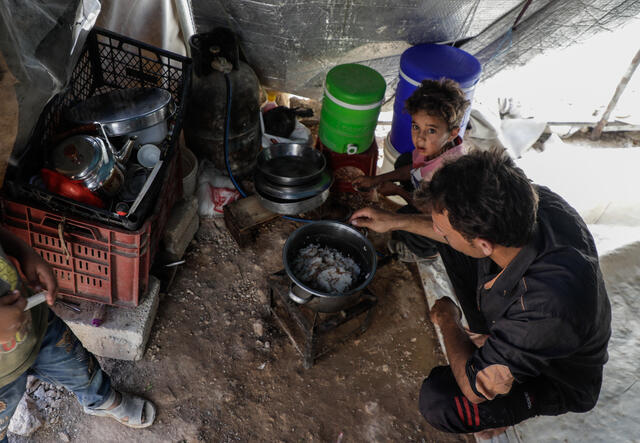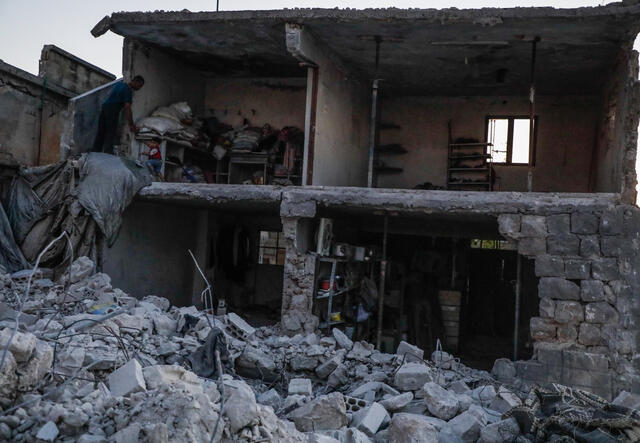
As COVID-19 spreads globally, people living in conflict zones with weak health systems will be hit hardest. These areas are home to displaced families and overcrowded refugee camps with limited resources. Just this week, the first reported case of this new coronavirus has been confirmed in Syria, which could lead to one of the most severe outbreaks in the world.
The International Rescue Committee is ramping up our response to the pandemic, providing lifesaving programs to vulnerable communities in over 40 countries worldwide, including the United States.
“While coronavirus is a serious threat where there is a health system, its dangers are magnified in communities where there is no such system,” says David Miliband, president and CEO of the International Rescue Committee. “This is a global disease and can be expected to hit all parts of the world; it's imperative to protect the most vulnerable.”
What are the challenges for people in conflict zones?
In countries like Syria, Yemen, Afghanistan and Iraq, years of conflict have weakened health systems and shut down medical facilities, putting millions of people at increased risk. Refugees and recently displaced people also tend to have a higher rate of underlying health issues due to the impacts of war, disease and famine, making them more susceptible to illness.
Intensive care, access to ventilators, oxygen … these are things that unfortunately don't really exist in a lot of the contexts in which we work.
“Health systems are already overstretched,” says Dr. Stacey Mearns, senior technical advisor for emergency health at the IRC. “What we've seen happen in places like Italy is really worrying when we think about people in places like Syria and other low-resource settings.”
“Intensive care, access to ventilators, oxygen … these are things that unfortunately don't really exist in a lot of the contexts in which we work,” Dr. Mearns explains. “How will those contexts cope with many more cases?”

In the northwestern Syrian province of Idlib alone, nearly a million people have been forced to flee their homes since December 2019. Many are living in overcrowded settlements where sanitation is poor and social distancing is nearly impossible. There are only three hospitals with intensive care units in the region.
The devastation that coronavirus will cause in Idlib is unimaginable.
“The devastation that coronavirus will cause in Idlib is unimaginable, where 85 attacks on health facilities took place last year, and the majority of the hospitals that remain open are unable to cope with the needs that already exist,” says Misty Buswell, regional policy and advocacy director for the IRC in the Middle East.
How is the IRC responding?
The IRC has launched a global response to the coronavirus pandemic, with a focus on reaching the most vulnerable where we work.
As #COVID19 spreads globally, our work continues in NW Syria, where recent fighting displaced almost a million people. Here our teams take precautionary measures to prevent the spread of the virus while helping families rebuild their lives. Our work: https://t.co/A0HHRUEKY1pic.twitter.com/oXKtoeaorn
— IRC - International Rescue Committee (@RESCUEorg) March 24, 2020
In preparation for the current outbreak in Syria, the IRC has been working with local communities and health care workers to help people prevent spreading the virus and understand where to seek support if they become ill. The IRC is also working with the World Health Organization and its partners to activate a response in an effort to contain the virus and minimize its impact.
For countries and offices across the world, the IRC has created a real-time risk categorization index and response plan. This is paired with ongoing efforts to keep staff and communities safe with the proper knowledge and supplies while delivering lifesaving care.
What still needs to be done?
Countries in crisis need immediate international assistance, including supplies for detecting, preventing and treating the coronavirus. This will become increasingly difficult as governments continue to close borders and restrict travel to mitigate the spread of the disease.

The United Nations, for example, is no longer able to provide medical supplies to northeast Syria from across the border. As a result, humanitarian organizations struggle to meet the needs of those in camps such as Al Hol, where 70,000 people are living in extremely cramped conditions.
“Globally, there is already a shortage of items such as masks, gloves and other personal protective equipment that are essential for health workers to be able to safely do their jobs,” says Buswell. “We are calling on the international community to take urgent action to support humanitarian efforts to scale up preparedness and response to COVID-19 in Syria.”